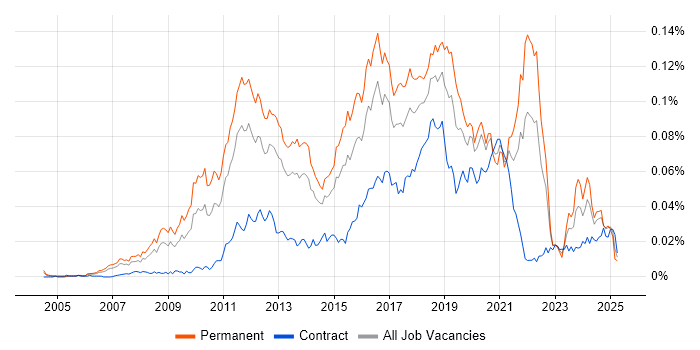Haskell
UK
The table below provides summary statistics and salary benchmarking for jobs requiring Haskell skills. It covers permanent job vacancies from the 6 months leading up to 5 March 2026, with comparisons to the same periods in the previous two years.
| 6 months to 5 Mar 2026 |
Same period 2025 | Same period 2024 | |
|---|---|---|---|
| Rank | 670 | 645 | 780 |
| Rank change year-on-year | -25 | +135 | +212 |
| Permanent jobs citing Haskell | 6 | 24 | 39 |
| As % of all permanent jobs in the UK | 0.008% | 0.053% | 0.050% |
| As % of the Programming Languages category | 0.045% | 0.15% | 0.14% |
| Number of salaries quoted | 6 | 10 | 36 |
| 10th Percentile | £75,000 | £52,500 | - |
| 25th Percentile | - | £58,438 | £76,250 |
| Median annual salary (50th Percentile) | £80,000 | £73,750 | £82,500 |
| Median % change year-on-year | +8.47% | -10.61% | - |
| 75th Percentile | - | £85,000 | £100,313 |
| 90th Percentile | - | - | £101,250 |
| UK excluding London median annual salary | - | £61,250 | £100,000 |
| % change year-on-year | - | -38.75% | +122.22% |
All Programming Languages
UK
Haskell falls under the Programming Languages category. For comparison with the information above, the following table provides summary statistics for all permanent job vacancies requiring coding skills.
| Permanent vacancies with a requirement for coding skills | 13,218 | 15,714 | 28,537 |
| As % of all permanent jobs advertised in the UK | 18.41% | 34.38% | 36.33% |
| Number of salaries quoted | 9,351 | 10,009 | 23,174 |
| 10th Percentile | £35,000 | £37,574 | £36,250 |
| 25th Percentile | £46,250 | £48,750 | £45,000 |
| Median annual salary (50th Percentile) | £62,500 | £65,000 | £60,000 |
| Median % change year-on-year | -3.85% | +8.33% | -7.69% |
| 75th Percentile | £83,750 | £86,250 | £80,000 |
| 90th Percentile | £100,000 | £110,000 | £100,000 |
| UK excluding London median annual salary | £55,000 | £57,500 | £54,000 |
| % change year-on-year | -4.35% | +6.48% | -1.82% |
Haskell
Job Vacancy Trend
Historical trend showing the proportion of permanent IT job postings citing Haskell relative to all permanent IT jobs advertised.

Haskell
Salary Trend
Salary distribution trend for jobs in the UK citing Haskell.

Haskell
Co-Occurring Skills & Capabilities by Category
The following tables expand on the one above by listing co-occurrences grouped by category. They cover the same employment type, locality and period, with up to 20 co-occurrences shown in each category:
|
|
||||||||||||||||||||||||
|
|||||||||||||||||||||||||
